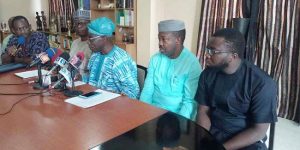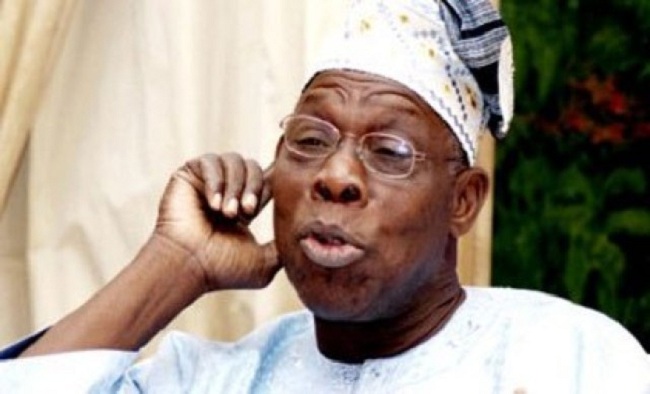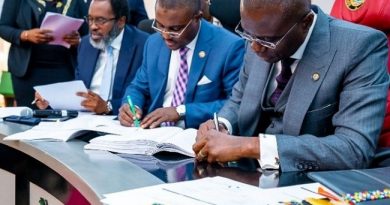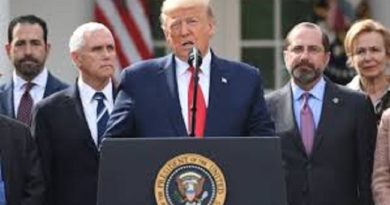Let’s Give Peace A Chance Obasanjo Warns Cattle Breeders
Former President Olusegun Obasanjo on Saturday met with leaders of Fulani cattle breeders in the Southwest as well as Kogi and Kwara States, over the wave of banditry and insecurity across the region.
 Obasanjo said what people knew about the security challenges in the Southwest before were all myths and not clarity, darkness and not light, hence the need for the meeting to properly interrogate the root cause of the banditry, kidnapping and other security challenges in Yorubaland.
Obasanjo said what people knew about the security challenges in the Southwest before were all myths and not clarity, darkness and not light, hence the need for the meeting to properly interrogate the root cause of the banditry, kidnapping and other security challenges in Yorubaland.
He charged the group to evolve a system that would enable them to effectively police their settlements in the Southwest so that the region could enjoy once more the peace it once knew.
The elder statesman addressed the meeting at his Olusegun Obasanjo Presidential Library (OOPL) in Abeokuta.
The younger Adewole was recently kidnapped from his farm in the outskirts of Ibadan.
Obasanjo told the Fulani group who came under the aegis of Gan Allah Fulani Development Association of Nigeria (GAFDAN) that the Yoruba wanted peace, harmony, wholesomeness, and progress in the region, stressing that the time had come for everybody to acknowledge that “bad things are happening” in the Southwest and which have been attracting bad names to the Fulani in their midst.
He urged Nigerians to stop the culture of “passing blame” and think of a lasting solution to the menace of armed banditry and other forms of insecurity.
He noted that the solution to the nation’s security challenges, including Southwest, should not be left to one person to address but through collective efforts.
Obasanjo said: “I take it that you are sufficiently knowledgeable, sufficiently aware, sufficiently understanding to be able to interact actively and successfully at this meeting on behalf of those that are not here.
“I believe that whatever we are able to achieve or to discuss or to disabuse in this zone will be taken as a model in other zones.
“I want to learn from you and I hope you will learn from me and at the end of the day, we will be all wiser and we will be able to determine what should be the way forward for us to get rid of bad things in our community.
“Let me tell you some of the reasons for our meeting. What has been happening in Nigeria, particularly in this area, the Southwest, we have got a lot of bad things happening here, let us not deceive ourselves.
“We have got a lot of heat, not enough light. And without adequate light, we may not be able to deal with the problem the way we want to and find a solution to it. We have got enough heat but we now need light to guide us so that we are all out there.
“Secondly, we are all in darkness, all of us. We need to be in the light. And those who may want to choose to be in darkness and want to deceive themselves, we can leave them in darkness but majority of us have to be in the light and let the light shine upon us so that we can see our faces, we can see ourselves as we are, where we are naked, let us see ourselves as naked, where we are half-covered, let us see ourselves as half-covered, where we are fully clothed, let us see ourselves as fully clothed.
“We are also going about among ourselves with history. Some of the histories that we are going about among ourselves are the histories we need not perpetuate.
“We are going about with myths; we are not going about with reality. We are going about with lack of clarity so what we want to do is to push aside myth and talk about reality; we want to talk about clarity. We want to see things clearly the way they are.
“There is criminality, there is insecurity and it has not been like that before. If this is what we have, what we want to do at this meeting is to find solutions to stop it.
“We want to interrogate and be inquisitive among ourselves about things around us but particularly about unusual things around us. We are not inquisitorial, we are not prosecutorial but we want to interrogate ourselves why is it, how is it, where is it and then we find solutions to it.
“We want to have peace, we want to have security, we want to have harmony, we want to have wholesomeness, we want to have progress, how can we have these? We want to move Nigeria forward, irrespective of tribe, religion, ethnicity, trade, profession, where I come from, where you come from.
“How can we together move Nigeria forward? And there is nobody else who will do all these for us; it is you, we, all of us here and all our brothers and sisters wherever they may be in Nigeria.
“It is not one man’s job or one person’s job or one group’s job, it a job for all of us, all Nigerians and unless and until we see it that way, we should stop passing blame, everybody is wrong and everybody is right.
“Let us take what is right in one group and join it what is right in other group and throw away what is wrong in all the groups then we will move forward.
“Our brothers and sisters in West Africa are worried about our situation. They are wondering if Nigeria cannot manage her security if Nigeria’s security is endangered, how can they look up to Nigeria who they normally see as big brother, that can be called upon to come and help them if they are in any type of problems. So, they are worried and we are here to assure them, to assuage their worry to be able to say yes, we are Nigerians, we can deal and we will deal with our security problem and any other problem that we need to deal with.
“I was born in a village and grew up among all tribes that were in that area: Igbira, Egun, Igbo, Igala, we don’t even call them Hausas or Fulanis, we called them Mallams because that is what we knew them as. We knew them as Mallams and we grew up friendly. Peace was reigning but what has now changed?
“From my own knowledge, when I joined the Army, I came back from training in 1959 to Kaduna, my interaction with the North and particularly with Hausa/Fulani is a different experience from the one that I hear and see today.
“Normally, you know it when a stranger gets into a community, the head of that community must know and it is the responsibility of the head of that community to maintain peace and security so what is the problem with our community leaders, the chiefs while things are going wrong in your community, is it that you do not have knowledge, is it that you do not know what is happening, what exactly is the problem? Because this is what I know, this is what used to happen and part of what we have to do is what is wrong that we have to put right.
“We must be able to have what I will call take away from this meeting. We will have positive measures that are measurable which we will put timeline to and which will be actioned by individuals and groups and which we can follow and see what progress we are making and maybe before long, we can then have what I will call progress meeting to discuss what we have achieved, what is left to be achieved, where do we move to next? But we must have as take away that which will work for us individually and collectively.”
Obasanjo however, tasked the GAFDAN members to evolve a system that would make the Fulani effectively police their environs in Yorubaland to enable them to spot out bad eggs among them in order to sustain the peace and harmony that hitherto prevailed in Southwest.
Some of the GAFDAN members who spoke at the meeting, however, identified foreign herders, particularly from Togo and Republic of Benin as the major sources of the security challenges in Nigeria, although they said some Yoruba people are collaborators.
GAFDAN Secretaries from Oyo, Garba Umar said the Fulani and farmers in Oyo State had evolved ways of settling disputes until the arrival of the foreign herders.
The meeting thereafter went into a closed-door session.
Only about three months ago, Obasanjo branded the aim of the terror sect Boko Haram as ‘Fulanisation’ of West Africa and Islamisation of Africa.
He urged an immediate and more aggressive approach by the federal government to deal with the current challenge of insecurity across the country brought about by the sect and its allies in ISIS.
Obasanjo, in a keynote address at the 2019 Synod of the Church of Nigeria (Anglican Communion), in Oleh, Isoko South council area of Delta State, said government should seek the opinions of all Nigerians that matter on the security situation and then proceed to bilateral, multinational, regional, continental and global levels for assistance in making the country safe for all.
“With ISIS involvement, we cannot but go global,” he said.
He spoke on the topic ‘Mobilizing Nigeria’s human and natural resources for national development and stability.’
Tracing the origin of the security threat to the Boko Haram insurgency and cattle rustling in the north, Obasanjo said: “They have both incubated and developed beyond what Nigeria can handle alone. They are now combined and internationalized with ISIS in control.
“It is no longer an issue of lack of education and lack of employment for our youths in Nigeria which it began as, it is now West African Fulanization, African Islamization and global organized crimes of human trafficking, money laundering, drug trafficking, gun trafficking, illegal mining, and regime change.”




